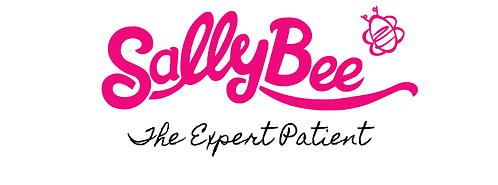Part 2 - Coping with a Cancer Diagnosis: A Brutally Honest & Refreshing Guide
- Sally Bee Team
- Nov 20, 2024
- 5 min read
Updated: Dec 4, 2024

Receiving a cancer diagnosis can feel like your world has been turned upside down. It’s natural to experience a flood of emotions—fear, uncertainty, anger, or even disbelief. These feelings are valid, and you’re not alone. While the journey ahead may seem daunting, it’s important to remember that you have the strength within you to face this challenge.
This article is here to offer support, practical advice, and a sense of hope. Whether you’re the one navigating the diagnosis or supporting a loved one, this guide will help you better understand how to cope with the emotional, physical, and mental hurdles of this journey.
You are stronger than you realise, and hope can be a powerful companion.
Facing Uncertainty with Strength: Sharing, Learning, and Growing
When life throws a challenge as big as a difficult diagnosis, it’s easy to feel overwhelmed. But remember, you don’t have to face it alone. Here are two key strategies to help you navigate this journey with clarity and support.
1. Talk About It
Opening up about your worries can be incredibly freeing. Whether it’s with a trusted loved one, a counsellor, or a support group, sharing your thoughts and feelings can make them feel more manageable. You know what they say: A problem shared is a problem halved! I’m not sure how that works, but it does!
Why it matters: Saying things out loud can help organise your thoughts, unravel your confusion, provide emotional relief, and allow others to offer the support you might need. I think we often expect the people around us to be mind-readers, which they are not. And think about it: if your thoughts and feelings confuse you - they will not be any clearer to anyone else. So take your time, but do talk about it! It’ll help.
How to start: Choose someone you trust and feel safe with. If talking feels hard, begin with small steps, like writing your thoughts down first or expressing them in a letter. Also be careful who you choose to share your feelings with. The last thing you need is false sympathy or for this to turn into their story! This is about YOU!
You might be surprised how much lighter the load feels when you share it with someone who cares.
Understanding Your Diagnosis: Taking Control with Knowledge
When faced with a health challenge, uncertainty can feel overwhelming. But understanding your diagnosis and treatment options can make a world of difference. Knowledge doesn’t just answer questions—it gives you the confidence to face what’s ahead and helps you feel more in control.
Educate Yourself: Start by asking your healthcare team to explain your diagnosis and treatment plan in clear, simple terms. I find its a good idea to take someone with you to the appointments who can take notes without being too emotional. Hopefully they will ask the questions at the time, that you will only think about later when you’ve calmed down!
Don’t hesitate to request explanations or ask for written materials to review later. You can also turn to trusted websites and patient advocacy groups for additional, reliable information. BUT - Don’t listen too hard to other peoples experiences. Remember they are not you. Your medical condition is completely unique to you. This is YOUR journey…oh and try to stay away from Dr Google. (I know you’ll ignore that bit of advice…but truthfully, if I paid attention to Dr Google about my condition, I’m buried 6 feet under…and I’m definitely not!)
Ask Questions: No question is too small or unimportant. Whether it’s about side effects, treatment timelines, or everyday concerns, write your questions down and bring them to your appointments. Having answers can replace fear with understanding and uncertainty with clarity.
Facing a health diagnosis is undoubtedly a journey, but it’s one you don’t have to walk unprepared. By seeking knowledge and building a solid understanding of your condition, you take the first steps toward feeling empowered and hopeful. You’ve got this—one step at a time.
When Your Mind Plays Tricks on You: Understanding Fear After a Cancer Diagnosis
It’s no secret that our minds are powerful, but sometimes, that power can work against us—especially after receiving a cancer diagnosis. Fear, uncertainty, and worry can take root and grow into larger-than-life thoughts, making the situation feel even scarier than it is. It’s important to understand how our minds can play tricks on us and, more importantly, how to keep them in check.
Why Does This Happen?
Our brains are wired to protect us, which means they’re always on high alert for potential threats. After a cancer diagnosis, this natural response can kick into overdrive. You might find yourself imagining worst-case scenarios or fixating on what might go wrong. This isn’t because you’re weak or irrational—it’s simply your mind trying to prepare you for the unknown.
Common Mental Tricks
Catastrophising: Turning “what if” thoughts into doomsday scenarios. For example, a small symptom might feel like proof that things are getting worse, even if it’s unrelated.
Tunnel Vision: Focusing solely on the fear and uncertainty, making it hard to see the progress or positive steps you’re taking.
Assuming the Worst: Believing that every bit of news will be bad or that treatment won’t work.
How to Handle It
The good news? You can train your mind to work with you, not against you.
Acknowledge Your Feelings: It’s okay to feel scared. Don’t judge yourself for it. Recognising that your thoughts are a natural reaction can help you separate them from reality.
Challenge Negative Thoughts: When fear creeps in, ask yourself, Is this thought based on facts or feelings? Remind yourself of what you know to be true.
Focus on What You Can Control: While you can’t control everything, you can control how you care for yourself, who you lean on for support, and the questions you ask your medical team. You can control how you react to anything.
Your mind may try to make things harder, but you have the power to push back with knowledge, support, and self-compassion. Fear may be part of the journey, but it doesn’t have to be the guide.
Final Thoughts
Facing cancer is undeniably hard. Take it one step at a time, focus on what you can control, and let hope guide you forward. You’re stronger than you think, and every small step you take is a victory worth celebrating.
READ PART 1 HERE
Come over and join our PRIVATE facebook group HERE
#cancer #Prostate #Prostatecancer #breast #Breastcancer #bowel #bowelcancer #lung #lungcancer #skin #skincancer #Firstsigns #Earlysigns #diagnosis #treatment #chemotherapy #tumour #stomach #stomachcancer #support #emotion #mentalhealth #consultant #oncologist #pain #sadness #empower #help




Comments